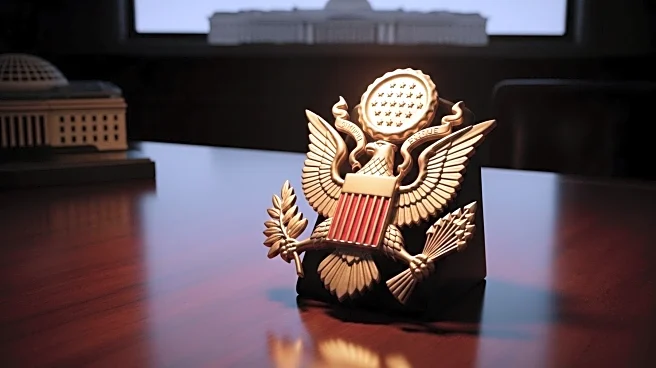What's Happening?
President Trump has announced that he has identified funds to ensure that active-duty military personnel receive their paychecks despite the ongoing federal government shutdown. In a post on Truth Social, Trump stated that he is using his authority as Commander in Chief to direct Secretary of War Pete Hegseth to utilize all available funds to pay the troops by October 15th. This move comes as Congress remains deadlocked over negotiations to reopen the government, risking the first missed paychecks for active-duty troops. A White House official indicated that the Defense Department would use research and development funding, which is available for two years, to cover military pay, although specific details on the amount of money set aside were not provided.
Why It's Important?
The decision to redirect funds to ensure military pay during a government shutdown highlights the prioritization of military personnel welfare amidst political gridlock. This action underscores the potential impact of government shutdowns on essential services and personnel, particularly those in active service. By securing military pay, President Trump aims to mitigate the immediate financial strain on service members and their families, who might otherwise face uncertainty. The use of research and development funds for this purpose may also raise questions about the long-term implications for defense projects and innovation, as resources are diverted to address immediate needs.
What's Next?
As the shutdown continues, the focus will likely remain on finding a resolution to the budget impasse in Congress. The redirection of funds to pay military personnel may prompt further discussions on the allocation of defense resources and the sustainability of such measures if the shutdown persists. Stakeholders, including political leaders and defense officials, may need to explore alternative funding strategies to ensure the continuity of essential services without compromising long-term defense capabilities. Additionally, the situation may influence public opinion and pressure lawmakers to expedite negotiations to reopen the government.
Beyond the Headlines
The decision to use research and development funds to pay military personnel during a shutdown may have broader implications for defense policy and innovation. This approach could set a precedent for how military funding is managed during fiscal crises, potentially affecting future defense projects and technological advancements. The ethical considerations of reallocating funds intended for development to cover immediate financial needs may also spark debate among policymakers and defense experts. Furthermore, the move reflects the challenges of balancing short-term exigencies with long-term strategic goals in national defense.










